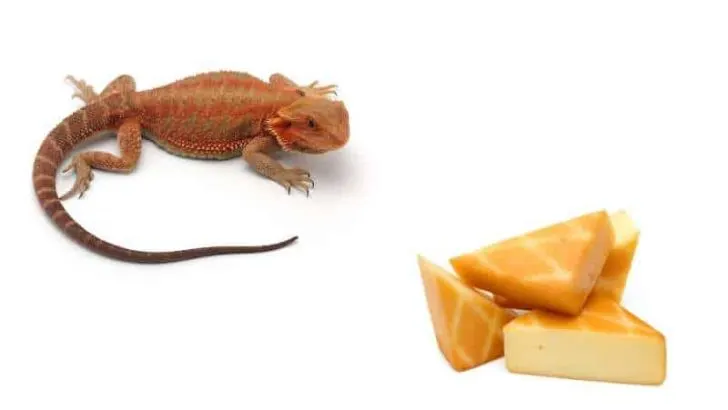If you own a bearded dragon, you want to make sure that it has a healthy lifestyle. Bearded dragons need calcium for proper development – and you’re probably familiar that cheese is rich in this nutrient.
So, you could be asking: Can bearded dragons eat cheese?
The answer is no; bearded dragons can’t eat cheese – or any other dairy product, for that matter – simply due to their nature. So, is cheese harmful to bearded dragons? Are there any alternatives to calcium-rich foods?
Answers to these – and many other – questions are covered in this article. So, be sure to keep scrolling!
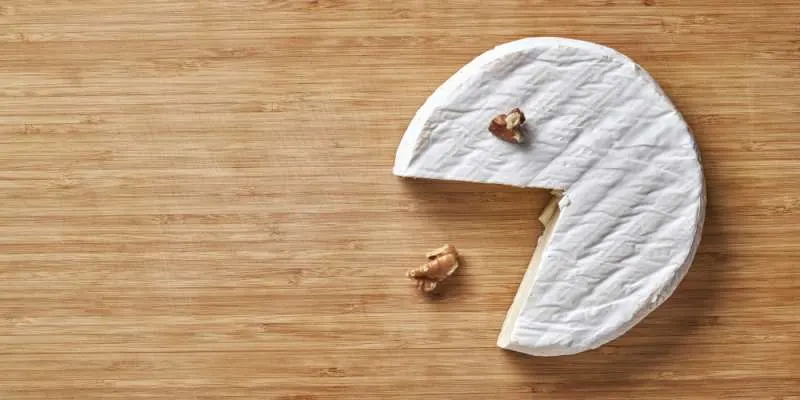
Why Isn’t Cheese Safe For Bearded Dragons?
Cheese and other dairy products are usually recommended as a good source of protein and calcium. While this is true for humans – and while bearded dragons need both of these nutrients – it gives off the false impression that it’s an acceptable food to include in your beardies diet.
Unfortunately, cheese is one of the worst things you could feed your bearded dragon with – and here’s why:
As bearded dragons are reptiles, they’re different from mammals in the sense that they don’t lactate. Females don’t produce milk, nor do bearded dragons drink milk while they are still young.
Because of this, bearded dragons haven’t evolved to possess or produce the required enzymes in their stomachs to break lactose down.
Lactose is a carbohydrate, and it’s not a surprise that most reptiles can’t tolerate it. All cheeses contain lactose to some degree, so it’s pretty much unavoidable.
Ultimately, beardies are unable to digest the milk proteins found in cheese. Also, they can’t even absorb the nutrients cheese may possess.
So, regardless of the type of cheese you were thinking of feeding your beardie – you should avoid it at all costs.
Protein and calcium are crucial in a bearded dragon’s diet, and cheese is packed with both of these nutrients. However, cheese and other dairy products aren’t a good option and shouldn’t be fed to beardies.
As a matter of fact, there’s no proven advantage of feeding cheese to your beardie at all.
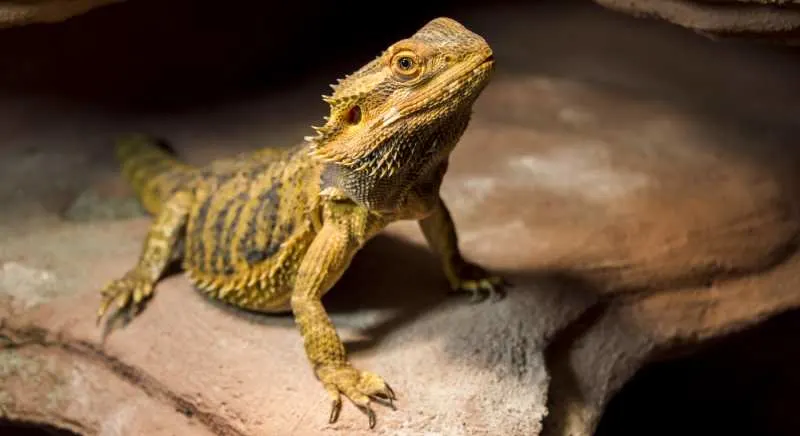
What Are The Risks?
All bearded dragons are lactose intolerant by default. They have a unique digestive system that doesn’t contain the necessary enzymes to break down lactose – be it from cheese or other forms of a diary.
Hence, consuming cheese will most likely result in adverse outcomes. Even the most minor amounts can lead to digestive upset, diarrhea, and bloating.
In more significant amounts, impaction can occur. In bearded dragons fed dairy products over an extended period of time, damage to the digestive tract has been observed.
In theory, bearded dragons would be able to eat cheese if they could drink milk. However, beardies should only drink water.
Water is the only fluid they need to stay hydrated.
It’s utterly irresponsible to offer cheese or other dairy products to beardies – or any type of reptile, for that matter.
If your beardie drinks milk by accident, make sure to watch it closely and contact your vet if you notice any abnormal behavior, reaction, or response.
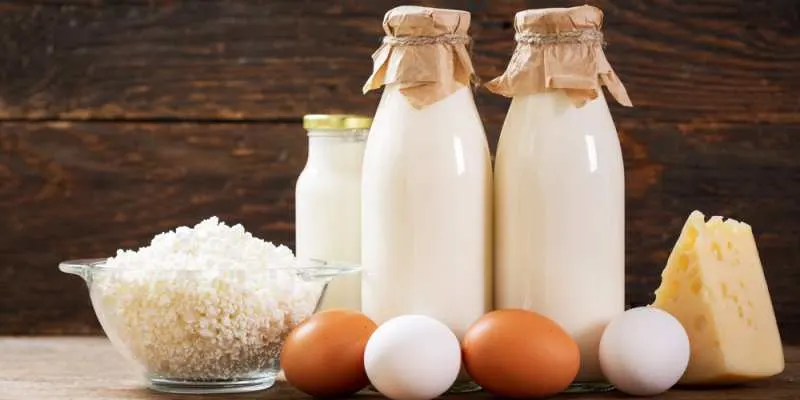
What About Other Dairy Products?
Beardies can’t eat other dairy products for the same reason they can’t eat cheese.
Other dairy products should be avoided, as well. These include:
- Milk
- Yogurt
- Cream
- Butter
- Ice cream
Most dairy products have high levels of fat in addition to containing lactose. Consuming foods with high-fat levels can lead to digestive upset and kidney failure.
The negative outcomes of consuming dairy products greatly outbalance any potential benefits, so be sure to avoid giving it to your beardie.
Remember, bearded dragons don’t have the necessary enzymes to process milk and other dairy products. In fact, there are no advantages to your beardie of drinking milk as all the nutrients, vitamins, and minerals can be acquired through other foods.
Some owners believe it’s fine to give their bearded dragons vegan alternatives to dairy products like soy and almond milk. However, these foods should also be avoided, too.
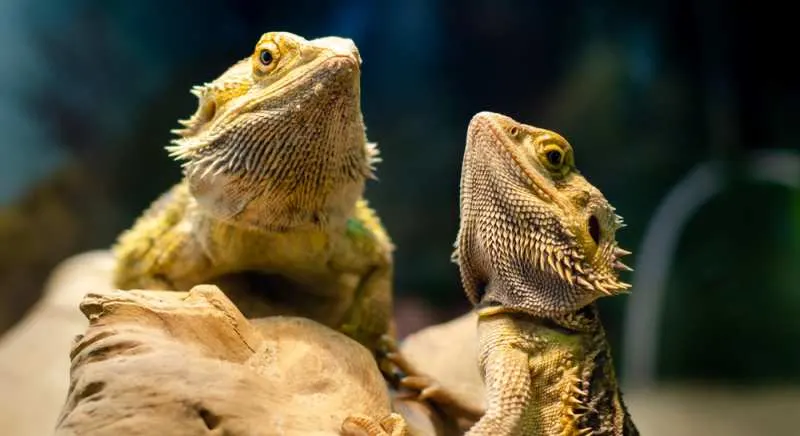
Let’s Talk About Calcium
As we already said, cheese and other dairy products are rich in calcium. However, you still shouldn’t feed cheese to your lizard friend.
Sure, beardies need calcium for bone development, muscle contractions, proper egg development, and good reproductive health in females.
Bearded dragon’s bodies need calcium so much that if their body becomes deficient, it starts pulling calcium from their bones which causes metabolic bone disease. This disease is one of the most common diseases among domestic beardies.
However, it’s easily preventable with proper diet and care.
Alert your vet as soon as you notice any sign of metabolic bone disease in your beardie.
These signs include:
- Lack of appetite
- Stress
- Lethargy
- Constipation
- Swollen limbs and jaw
- Receded lower jaw
- Soft jaw and facial bones
- Tremors and seizures
- Difficulty moving or paralysis
Better Food Sources For Calcium And Protein
If you’re worried about the lack of calcium in your beardies diet, you can add calcium powder to their regular meal. That works incredibly well and is an approach that many owners have undertaken.
One thing to consider when adding calcium powder, though, is that it needs to be done in moderation, according to your beardie’s age and health status.
Too much calcium can lead to bone health issues, so be sure to check with your vet about supplementation concerns you might have.
Even with proper supplementation, it’s still essential to provide calcium-rich foods to your beardie. Leafy greens are excellent sources of calcium for bearded dragons, especially these options:
- Prickly pear
- Cactus pad
- Collard greens
- Dandelion leaves
- Mustard greens
- Turnip greens
- Kale
- Grape leaves
- Rosemary
Another factor in improving your beardie’s calcium absorption is ensuring their enclosures are fitted with UV lamps.
Certain insects are much better and healthier when it comes to protein – crickets and black soldier fly are great examples.
Make sure you get your beardie’s insects from a feeder insect supplier, though. Please, never feed your bearded dragon bugs you find outside. That’s because it’s typical for bugs you see outside to have parasites and a trace amount of pesticides, both of which are dangerous for your pet.
Baby bearded dragons need more protein in their diet as opposed to adult beardies. As they age, they naturally become more herbivorous as their protein needs are reduced.
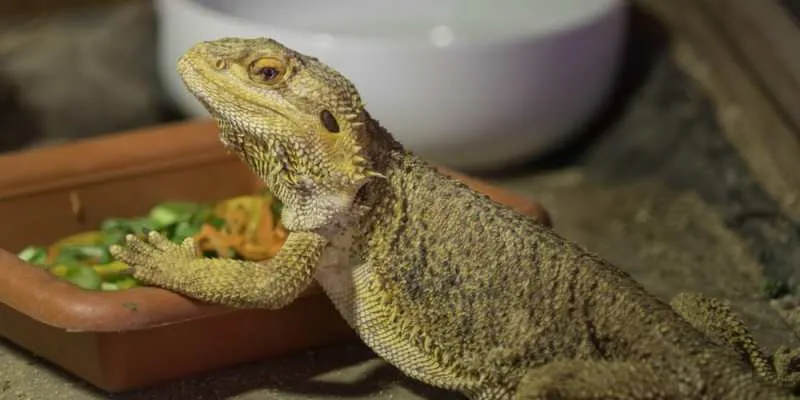
Some Other Foods Bearded Dragons Should Avoid
Bearded dragons do best with an omnivorous diet where the ratio of plant and animal matter changes according to their age.
Beardies eat mostly insects as babies. Their diet needs around 80% animal matter and 20% plant matter at this stage of life. As they grow, they need more plants in their diet until the ratio becomes around 50/50.
Reptile specialists and veterinarians are keen to stress the importance of a balanced diet and ensuring you feed an age-dependent diet.
While there are certain foods that bearded dragons should eat, some food sources should be avoided at all costs.
Aside from cheese and dairy products, beardies should avoid eating avocados. While they can eat most veggies and fruits, avocados should be avoided. That’s because avocados contain oxalic acid.
Even in small quantities, this acid can make your beardie very sick. And if ingested in higher amounts, it could be lethal.
Another food that should be avoided is beet tops, as it hinders calcium absorption. Fireflies are toxic to bearded dragons and can even be fatal. Rhubarb can also be deadly to beardies, so avoid it at all costs.
Lettuce is the least harmful food for bearded dragons of all mentioned foods. However, lettuce has nothing to offer nutrition vise to your beardie. Even more so, it can cause problems in the digestive tract and diarrhea.
Spinach should also be avoided as it hinders calcium absorption. If you offer your beardie some spinach as an occasional treat, it’s unlikely to harm your lizard – but we would still advise you to avoid it.
If your bearded dragon consumes any of the foods mentioned above, you must contact your vet as soon as possible. You need to get your bearded dragon the support they need before their health deteriorates.

Bottom Line
If you’re somehow still unsure about the whole “can bearded dragons eat cheese” thing, let us break it down for you once and for all.
The fact that bearded dragons are reptiles that don’t produce milk for their young is enough evidence to suggest that dairy products like cheese aren’t natural for them.
Unlike mammals, bearded dragons and other reptiles can’t obtain any nutritional benefit from cheese and other dairy products. That’s because they can’t safely digest cheese and dairy products – they’re missing the necessary enzymes to do so.
Bearded dragons can’t break lactose – which is found in cheese – down effectively.
Aside from cheese, be sure to avoid other harmful foods and instead stick to suitable foods with appropriate calcium supplementation.
Remember that you should always stick as close to their natural diet as possible and get the balance of nutrients right to keep your lizard friend healthy and happy.
For any concerns regarding beardie’s diet, be sure to ask your vet. They’ll tell you what’s best!

